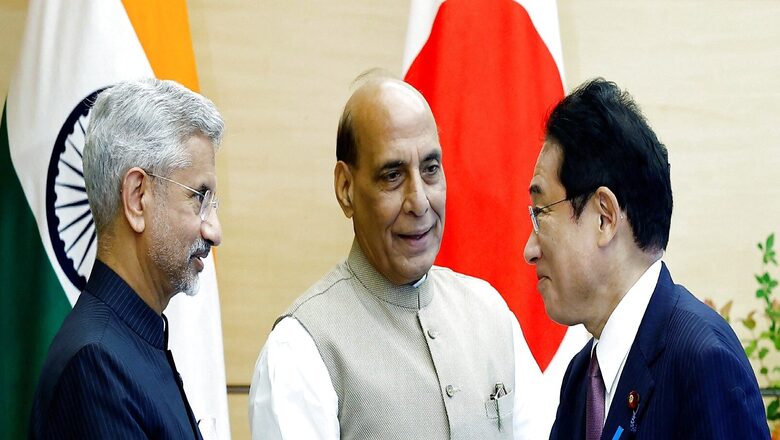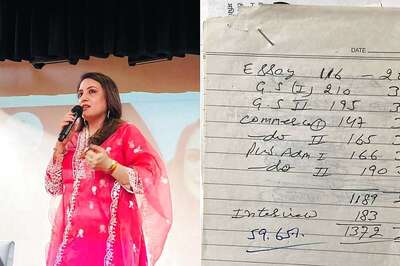
views
In recent years, New Delhi and Tokyo have intensified their aspirations to assume a greater role in providing security for the Indo-Pacific region. In this regard, deepening defence cooperation between the two is a natural continuation of their already growing bilateral relations. India and Japan are holding their maiden joint air exercise, Veer Guardian 2023 from 12 to 26 January, which seeks to promote air defence cooperation between the two sides.
India and Japan are — what international scholars call — natural allies. The air exercise, along with several other bilateral exercises, illustrates the growing resolve and commitment of both nations to enhance their security cooperation.
The Indo-Pacific region is facing myriad challenges, majorly due to a shifting balance of power and increasing uncertainty about what the future world order looks like. This has led to various nations stepping up their security strategies and defence cooperation. One such nation is Japan.
Veering away from its pacifist constitution, Japan recently unveiled its National Security Strategy (NSS) which calls for boosting defence spending in the face of growing threats from regional rivals. Japan declared in its NSS, which was announced alongside the Security Strategy, that it wants to promote training and exercises, as well as defence equipment and technology collaboration with India. In this context, it is critical to examine where the two countries fit in each other’s strategic vision.
Veer Guardian 2023: Maiden Indo-Japan Air Combat Exercise
On 8 September 2022, India and Japan agreed to increase bilateral defence cooperation and conduct additional military exercises at the second 2+2 Foreign and Defence Ministerial meeting in Tokyo, Japan. As a result, India and Japan are carrying out their first air exercise, Veer Guardian 2023. The name alludes to “Exercise Dharma Guardian,” a bilateral exercise undertaken by the Indian Army and the Japanese Ground Self-Defence Force.
The 15-day-long bilateral exercise, Veer Guardian 2023, is taking place at the Hyakuri Air Base in Japan and involves featuring several aerial combat drills between the Indian Air Force (IAF) and the Japan Air Self-Defence Force (JASDF). According to the IAF, they are conducting multi-domain air combat missions in a complicated environment and sharing best practices. Squadron Leader Avni Chaturvedi, India’s first female fighter pilot, will also be taking part in the exercise, which makes her IAF’s first female officer to take part in an international war game held outside of the country.
While the navy and army of both nations regularly participate in bilateral exercises, particularly JIMEX and Dharma Guardian, as well as the Malabar and MILAN naval exercises, Veer Guardian 2023 will be the first bilateral exercise of both nations’ air force. According to the IAF, Veer Guardian would strengthen the two air forces’ long-standing partnership and expand areas of defence cooperation. It will be another step toward deeper strategic ties and closer defence collaboration between the two countries.
A look beyond Quad
With the advent of new players, growing power imbalances, and the resulting challenges to regional security, the Indo-Pacific geopolitical landscape has undergone remarkable changes. An aggressively rising China has resulted in a convoluted regional security environment, resulting in a dramatic turnaround in major power relations, particularly India-Japan relations. As great power conflict in the region intensifies, India and Japan, along with the United States and Australia, have come closer in an effort to construct a new security architecture. This has manifested itself in the form of Quad.
However, the Indo-Japan security relationship extends much beyond Quad. Since the release of the India-Japan Joint Declaration on Security Cooperation in 2008, both countries have achieved tremendous progress in encouraging joint efforts toward shared security. India and Japan have been cooperating on defence technology since 2014-15, when the Joint Working Group on Defence Equipment and Technology Cooperation (JWG-DETC) was established. It aimed to offer a continuous leadership focus to the bilateral defence trade partnership and to promote prospects for defence equipment co-production and development. Both countries reached an understanding in 2015 on two major security agreements focussing on security measures for the protection of classified military information and the transfer of defence equipment and technology. In September 2017, India and Japan held their first-ever Defense Industry Forum.
2019 marked a major breakthrough in bilateral relations between the two countries, particularly in the defence sector. They agreed to conduct a 2+2 ministerial dialogue with their respective defence and foreign ministries. Japan was only the second country with whom India had such a high level of engagement, after the US.
In 2020, the two countries deepened their maritime security cooperation by signing a Mutual Logistics and Supply Agreement (MLSA), which granted access to each other’s bases and a multitude of related supplies.
The two nations held their second 2+2 ministerial dialogue in Tokyo in 2022. According to the Indian EAM, the 2+2 Foreign and Defence Ministerial meeting underlines India’s commitment to enhancing bilateral security and defence cooperation between the two Asian nations. India and Japan also hold a number of policy dialogues aimed at improving defence cooperation. In addition to the Annual Defence Ministerial Dialogue, the two countries hold a National Security Advisers’ Dialogue and a Defence Policy Dialogue.
Bharat Electronics Ltd (BEL), a defence PSU, is in talks with two Japanese businesses, Toshiba Corporation for Li-Ion battery technology and Jupitor Corporation for the supply of Anti-Drone Systems. If successful, this will provide the Indo-Japan defence cooperation a considerable boost.
With the publication of Japan’s 2022 National Defence Strategy, it is expected that bilateral and multilateral defence relations with India will be strengthened even further. Service-to-service exchanges will take place in a variety of domains, including maritime security and cyber security. Japan’s intention to enhance training and exercises, as well as defence equipment and technology cooperation with India, is also expressed in its 2022 National Defence Strategy.
What does the future look like?
India’s ties with Japan have grown substantially in the recent decade, yet there are still many untapped avenues in this relationship. To offset China’s growing influence in strategic infrastructure, India and Japan unveiled the Asia-Africa Growth Corridor (AAGC) at the African Development Bank Summit’s 52nd Annual Meeting in May 2017. However, there is little evidence of progress.
The ShinMaywa US-2 Amphibian aircraft sale is one of the biggest points of stalemate in Indo-Japan defence ties. While significant progress was made during the 2020 DefExpo, the deal’s future remains questionable. In addition, the Reciprocal Access Agreement that Japan has with nations like Australia is much more comprehensive than the Indo-Japanese Mutual Logistics and Supply Agreement (MLSA), which is much narrower in scope than the Reciprocal Access Agreement.
Despite the fact that there is still room for improvement, both parties have demonstrated the awareness and willingness necessary to further strengthen their defence cooperation. Deepening defence exchanges, expanding maritime cooperation, especially Maritime Domain Awareness (MDA), and increasing defence equipment and technological collaboration were all key themes of Indian Defence Minister Rajnath Singh’s address at the 2022 2+2 Dialogue.
Satoshi Suzuki, Japan’s Ambassador to India, stated that Japan can assist India in developing an indigenous fifth-generation stealth aircraft as well as future-generation naval vessels and submarines. Such a commitment is expected to open up new avenues of collaborative development in defence technologies in the future. Defence and security cooperation is an important component of India’s strategic engagement with Japan, which has grown since 2015 owing to increased political and bureaucratic dialogue and military personnel exchanges.
While the late Japanese Prime Minister Abe Shinzo was a driving force in strengthening the India-Japan relationship, there is a growing consensus among international experts that the relations will be sustained with the same fervour under future administrations.
Esha Banerji is presently associated with a premier think-tank in India, specialising in defence, security, and strategic studies. Her research interest and focuses of analysis are defence strategy, geo-economics, foreign affairs, and the implications of Chinese security developments on the region, especially India. Views expressed are personal.
Read all the Latest Opinions here




















Comments
0 comment